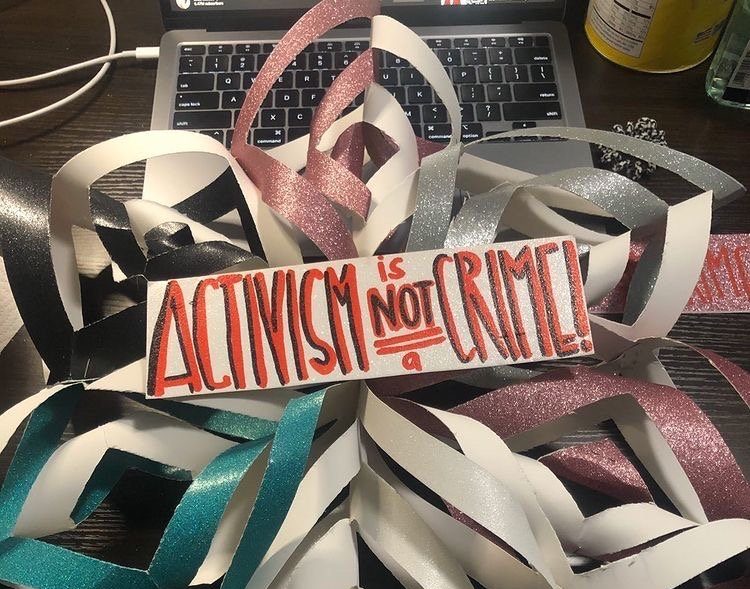Coalition of Local Filipino Organizations Aims to Shine Light on Human Rights With Virtual Pailaw Parol Parade
4 minute readUnder the glow of homemade parols—ornamental holiday lanterns traditionally lit in the Philippines this time of year—a coalition of local Filipino organizations is hosting its annual Pailaw Parol Parade on Saturday. Last year’s event in Los Angeles brought together 200 attendees with a march down Wilshire Boulevard, but this year, due to the pandemic, it will be held virtually.
Pailaw—in Tagalog, the native tongue of Filipinos—means to illuminate and bring light.
“The parol symbolizes triumph of light over darkness and Filipino people’s goodwill,” says Jennifer Benitez, deputy secretary of the Philippine-U.S. Solidarity Organization (PUSO SoCal). “We wanted to use that symbol of hope as a way of commemorating International Human Rights Day.”
It has been an especially dark year in the Philippines. Under the guise of protecting its nation under the global pandemic, President Rodrigo Duterte and his militarized regime have been infringing harder than ever on residents’ basic rights, enacting one of the longest recorded lockdowns in the world and issuing “shoot to kill” orders for those who do not comply.
Between March 17 and July 25, Philippines police arrested 76,000 people and recorded more than 260,000 violations of curfew or lockdown violations, according to the Washington Post. The Philippines Commission on Human Rights reported more than 900 complaints of torture, inhumane treatment, arrests, and detention at the hands of the state.
In July, the Duterte regime cracked down even further with the adoption of the “Anti-Terrorism Act of 2020,” an ambiguously-titled piece of legislation designed to repress and criminalize free speech and anti-government sentiment while allowing for people to be detained for weeks without charge.
Then, in November, within a span of 12 days, two devastating typhoons swept across the country, leaving nearly 100 dead and more than a million people displaced, evacuated, or without electricity. The Duterte regime’s handling of both the typhoons and the pandemic—which led to one of the worst outbreaks in Asia—has been widely criticized.
Tomisin Oluwole
Fragmented Reflection I, 2021
Acrylic on canvas panel
24 x 30 inches
Click here to check out our interview with Tomisin Oluwole, a literary and visual artist based in Long Beach.

Instead of gunking up our site with ads, we use this space to display and promote the work of local artists.
“There’s a lot of connection with issues happening in the Philippines, such as intense state repression, dictatorship, and [Duterte’s] attacks on human rights defenders, women, and peasant farmers,” says Benitez of PUSO-SoCal. “It’s very similar to the way we’ve been seeing the rise of BLM and people protesting against police brutality and state terror. And with the fight for cancellation of rent across the US in the midst of the pandemic, there’s similar issues happening in the Philippines, with the state trying to push people off their land.”
Here in the U.S., Filipino-Americans have also been hit disproportionately hard by the pandemic. A report released in September from National Nurses United—the country’s largest union of registered nurses—revealed that while Filipino nurses only comprise 4% of the workforce nationwide, they accounted for 31.5% of COVID-19 related deaths. Back in July, the L.A. Times reported that Filipino-Americans account for 35% of all COVID-19 deaths in California’s Asian population.

Filipino frontliners in the U.S. have been disproportionately affected by COVID-19. Photo courtesy of the Malaya Movement.
The Pailaw Parol Parade, which will take place via Zoom from 5 p.m. to 6:30 p.m. and will feature speakers from PUSO-SoCal; Filipino Youth in Action; GABRIELA South Bay; Anakbayan of Long Beach and Los Angeles; Malaya Movement of Long Beach and Carson; and Pagsikapan, a Pilipinx-American Student Community.
Benitez says the organizers hope to inspire and instill a sense of togetherness, while also bringing to light the tragedies endured by Filipino communities, particularly in the aftermath of the typhoons. Organizers hope to raise at least $300 on Saturday for typhoon relief efforts.
“We know that a lot of our Filipino community members have family who’ve been affected by the two typhoons in November and had to be evacuated,” Benitez says.
To RSVP for the Pailaw Parol Parade, visit tinyurl.com/pailawparolparade. This virtual event is free and open to the public. Attendees are encouraged to bring their own parol or a flashlight. You can also order holiday cards and help raise money for typhoon relief.




 esther@forthe.org
esther@forthe.org




